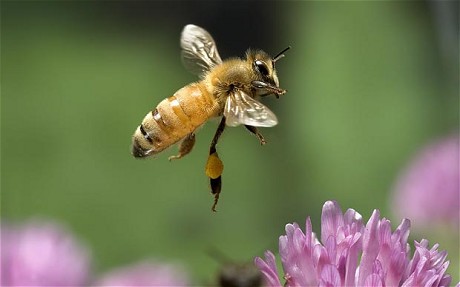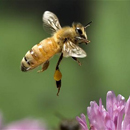Einstein Was Right - Honey Bee Collapse Threatens Global Food Security
Telegraph, UK
Sun February 6, 2011
The bee crisis has been treated as a niche concern until now, but as the UN's index of food prices hits an all time-high, it is becoming urgent to know whether the plight of the honey bee risks further exhausting our food security.
Almost a third of global farm output depends on animal pollination, largely by honey bees.
These foods provide 35pc of our calories, most of our minerals, vitamins, and anti-oxidants, and the foundations of gastronomy. Yet the bees are dying - or being killed - at a disturbing pace.
The story of "colony collapse disorder" (CCD) is already well-known to readers of The Daily Telegraph.
Some keep hives at home and have experienced this mystery plague, and doubtless have strong views on whether it is caused by parasites, or a virus, or use of pesticides that play havoc with the nervous system of young bees, or a synergy of destructive forces coming together.
The bee crisis has been treated as a niche concern until now, but as the UN's index of food prices hits an all time-high in real terms (not just nominal) and grain shortages trigger revolutions in the Middle East, it is becoming urgent to know whether the plight of the honey bee risks further exhausting our already thin margin of food global security.
The agri-business lender Rabobank said the numbers of US bee colonies failing to survive each winter has risen to 30pc to 35pc from an historical norm of 10pc. The rate is 20pc or higher in much of Europe, and the same pattern is emerging in Latin America and Asia.
Albert Einstein, who liked to make bold claims (often wrong), famously said that "if the bee disappeared off the surface of the globe, man would have only four years to live".
Such "apocalyptic scenarios" are overblown, said Rabobank. The staples of corn, wheat, and rice are all pollinated by wind.
However, animal pollination is essential for nuts, melons and berries, and plays varying roles in citrus fruits, apples, onions, broccoli, cabbage, sprouts, courgettes, peppers, aubergines, avocados, cucumbers, coconuts, tomatoes and broad beans, as well as coffee and cocoa.
This is the fastest growing and most valuable part of the global farm economy. Between 80pc and 90pc of pollination comes from domesticated honey bees. Moths and butterflies lack the range to penetrate large fields.
The reservoir of bees is dwindling to the point where ratios are dangerously out of kilter, with the US reaching the "most extreme" imbalance. Pollinated crop output has quadrupled since 1961, yet bee colonies have halved. The bee-per-hectare count has fallen nearly 90pc.
"Farmers have managed to produce with relatively fewer bee colonies up to this point, and there is no evidence of agricultural yields being affected. The question is how much further this situation can be stretched," said the report.
Rabobank said US bee colonies were shrinking even before CCD struck because cheap imports of Asian honey had undercut US hives. Note the parallel with the demise of the US rare earth metals industry, put out of business when China flooded the world with cheaper supplies in the 1990s. This is what happens when free trade is managed carelessly.
China has its own problems. Pesticides used in pear orchards wiped out bees in parts of Sichuan in the 1980s. Crops are now pollinated by hand using feather brushes, a laborious process as one bee colony can pollinate up to 300m flowers a day.
Germany, France and Italy have banned some pesticides, especially neonicotinoids (as in tobacco) that harm the memories of bees.
The British Beekeepers' Association has called for an "urgent review" of these chemicals, fearing we may lose all our bees within a decade if we are not careful. US beekeepers have made similar pleas. The US agriculture department's Bee Research Laboratory has found evidence that even low levels of these pesticides reduce the resistance of bees to fungal pathogens.
Leaked documents from the Environmental Protection Agency confirm that clothianidin used on corn seed is "highly toxic", may pose a "long-term risk" to bees, and that previous tests were flawed.
Critics alleged a cover-up: Rabobank said we should be careful not to vilify agro-industry. The world needs food and fertilizer companies to keep finding ways to raise crop yields, if we are to feed over 70m extra mouths each year, and meet the demands of Asia's diet revolution, offset water scarcity in China and India, and divert a great chunk of the US, Argentine, and EU grain harvest into bio-fuels for cars.
With pincers closing in on world food output from so many sides, we have little margin for error. Scientists are coming to the rescue. Research is honing in on the fungus Nosema, and the Varroa mite, but not fast enough.
Rabobank calls for a step-change in the global response, and in the meantime for tougher rules, so that beekeepers do not have to fight alone, starting with curbs on pesticide use during in daylight hours when bees are foraging.
Apian atrophy is a more immediate threat than global warming, and can be solved, yet has barely risen onto the policy radar screen. This is surely a misjudgment.
Einstein was not always wrong.





 Share your thoughts in the Forum
Share your thoughts in the Forum
